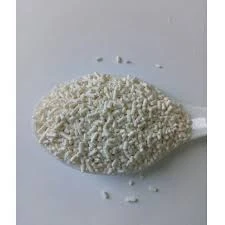
sweeteners 950 951 and 952
The Role of Sweeteners A Focus on E950, E951, and E952
In recent years, the use of sweeteners has become increasingly common in various food and beverage products. Among them, the sweeteners classified as E950 (Acesulfame K), E951 (Aspartame), and E952 (Cyclamate) stand out due to their widespread application and distinct characteristics. Understanding their chemical properties, benefits, and potential health concerns is essential for consumers aiming to make informed dietary choices.
E950 Acesulfame K
Acesulfame K, often referred to simply as Ace-K, is a non-caloric sweetener that is approximately 200 times sweeter than sucrose (table sugar). It is frequently used in combination with other sweeteners to enhance flavor profiles, since it can mask the aftertaste often associated with artificial sweeteners. Acesulfame K is stable under heat, making it an ideal candidate for baking and cooking.
One of the significant benefits of Acesulfame K is that it does not contribute to calorie intake, making it popular among those seeking to reduce sugar consumption for weight management or health reasons. Regulatory bodies, including the European Food Safety Authority (EFSA) and the U.S. Food and Drug Administration (FDA), have deemed Acesulfame K safe for consumption within established acceptable daily intake limits.
However, some individuals express concerns about the long-term effects of consuming synthetic sweeteners, leading to ongoing debates about their safety. While studies have not conclusively linked Acesulfame K to adverse health effects, it is advisable for consumers to monitor their overall intake of artificial sweeteners.
E951 Aspartame
sweeteners 950 951 and 952

Aspartame is another widely used low-calorie sweetener that is approximately 200 times sweeter than sugar. It is composed of two amino acids, aspartic acid and phenylalanine, and is commonly found in diet sodas, sugar-free gum, and various low-calorie snacks. One of the appealing aspects of aspartame is its ability to mimic the taste of sugar closely, which enhances the palatability of low-calorie products.
Despite its popularity, Aspartame has faced scrutiny and controversy regarding its safety. Certain populations, particularly individuals with phenylketonuria (PKU), must avoid aspartame due to an inability to metabolize phenylalanine. Regulatory agencies have established acceptable daily intake levels, which most studies suggest can be safely consumed by the general population. Nevertheless, individuals concerned about potential side effects may prefer to limit their intake.
E952 Cyclamate
Cyclamate, often found in combination with other artificial sweeteners, is around 30 times sweeter than sugar and does not contribute any calories. It has a long history of use in some countries, though it is banned in the U.S. due to historical studies suggesting a potential carcinogenic risk. However, many other countries, including those in the EU, continue to allow its use, citing more recent research as evidence of its safety when consumed at regulated levels.
Cyclamate is often found in tabletop sweeteners and in various processed foods. Like other artificial sweeteners, it appeals to those seeking to reduce sugar intake without sacrificing sweetness. Consumers should, however, remain informed about regional regulations and recommendations regarding cyclamate's use.
Conclusion
As the market for low-calorie foods and beverages continues to expand, sweeteners such as E950 (Acesulfame K), E951 (Aspartame), and E952 (Cyclamate) play an important role in providing sweetness without the added calories. While these sweeteners have been deemed safe by various health authorities, individual responses may vary, and ongoing research is essential to fully understand their long-term effects. As with all dietary components, moderation is key, and consumers should be mindful of their sweetener choices, considering both taste preferences and health implications. In making informed decisions, individuals can enjoy the benefit of sweetness while maintaining their health goals.
-
Pure Sodium Dichloroisocyanurate Dihydrate | Powerful DisinfectantNewsAug.29,2025
-
Industrial Chemicals: Quality & Purity for Every IndustryNewsAug.28,2025
-
Nitrile Rubber Honoring Strict Production StandardsNewsAug.22,2025
-
Aspartame Ingredients Honoring Food Safety ValuesNewsAug.22,2025
-
Fertilizer for Balanced Plant NutritionNewsAug.22,2025
-
Cyanide Gold Processing with High Purity AdditivesNewsAug.22,2025
-
Formic Acid in Textile Dyeing ApplicationsNewsAug.22,2025
Hebei Tenger Chemical Technology Co., Ltd. focuses on the chemical industry and is committed to the export service of chemical raw materials.
-

view more DiethanolisopropanolamineIn the ever-growing field of chemical solutions, diethanolisopropanolamine (DEIPA) stands out as a versatile and important compound. Due to its unique chemical structure and properties, DEIPA is of interest to various industries including construction, personal care, and agriculture. -

view more TriisopropanolamineTriisopropanolamine (TIPA) alkanol amine substance, is a kind of alcohol amine compound with amino and alcohol hydroxyl, and because of its molecules contains both amino and hydroxyl. -

view more Tetramethyl Thiuram DisulfideTetramethyl thiuram disulfide, also known as TMTD, is a white to light-yellow powder with a distinct sulfur-like odor. It is soluble in organic solvents such as benzene, acetone, and ethyl acetate, making it highly versatile for use in different formulations. TMTD is known for its excellent vulcanization acceleration properties, which makes it a key ingredient in the production of rubber products. Additionally, it acts as an effective fungicide and bactericide, making it valuable in agricultural applications. Its high purity and stability ensure consistent performance, making it a preferred choice for manufacturers across various industries.





